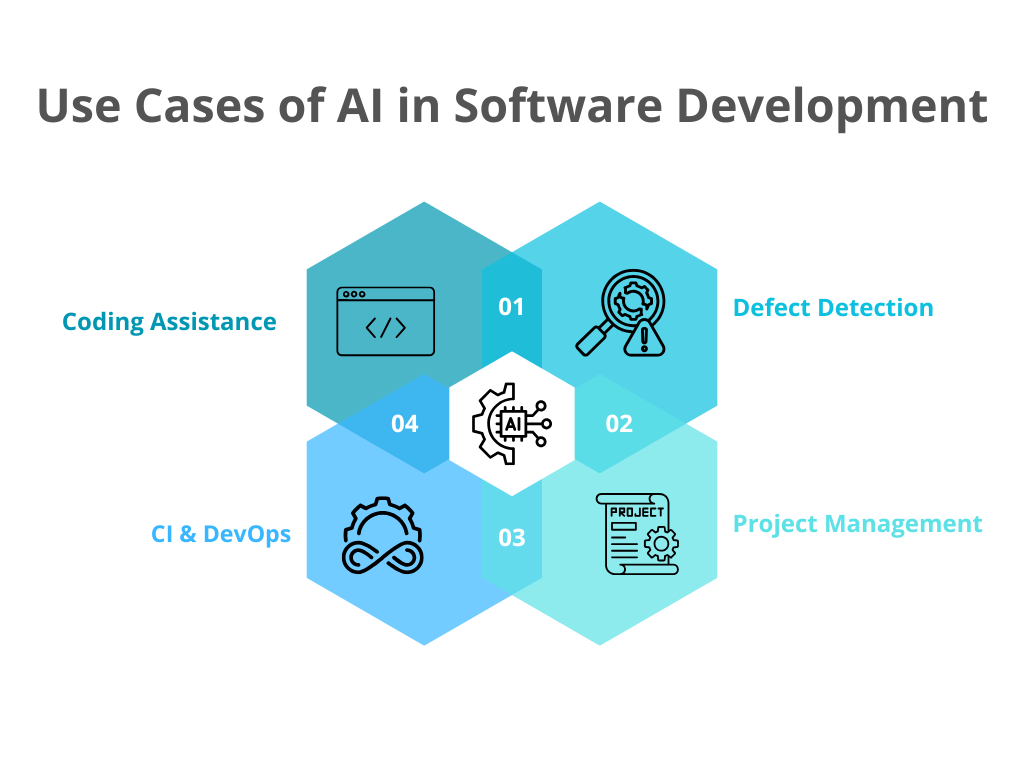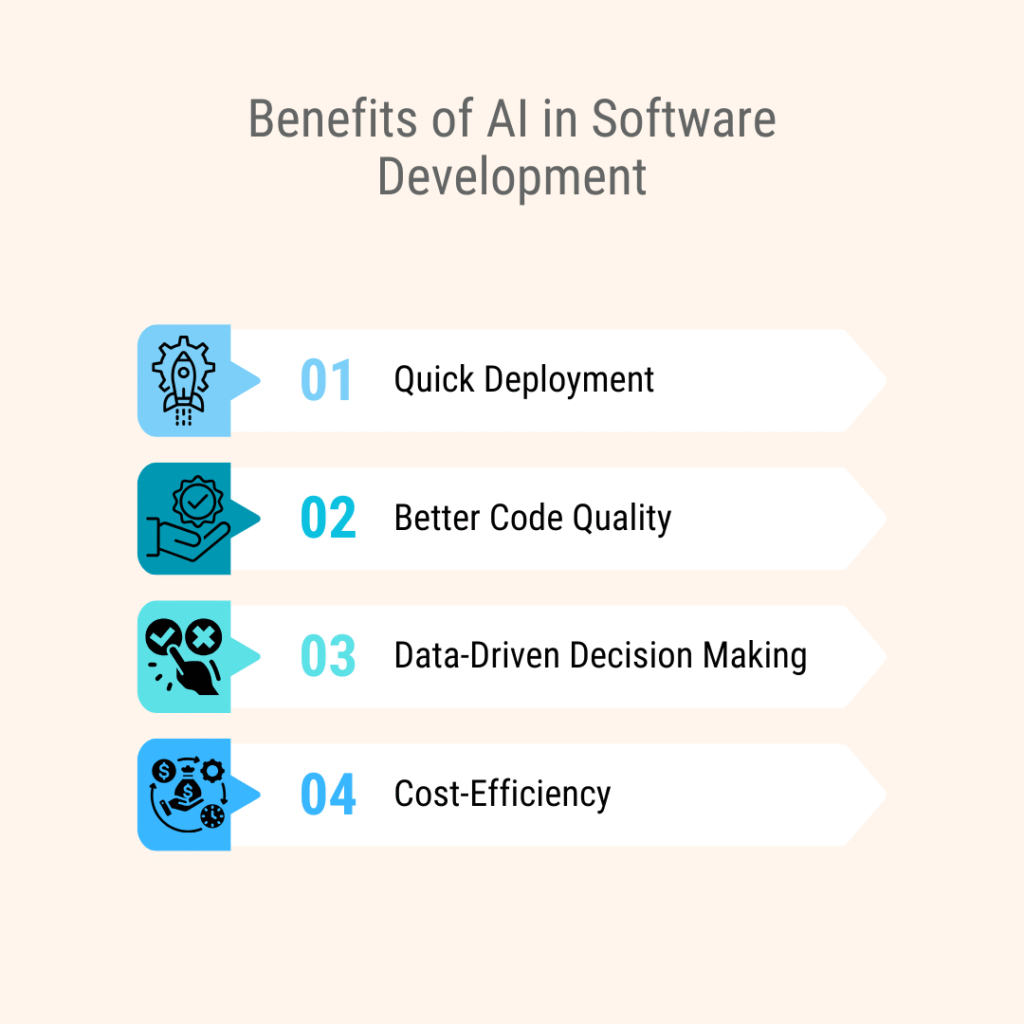As per the 2024 Developer Survey report, around 76% of respondents are either using or planning to adopt AI tools for development projects, which is a 6% increase from the 2023 report. This indicates that a skill that was once entirely human-driven and based out of creativity, is now enhanced with the AI use cases.
However, this shift of using AI in software development brings in a lot of challenges alongside opportunities for the developers. Today, the experts have to revisit their arsenal of skills for adapting to this evolving technological landscape.
However, what is the future of AI in software development? How is it reshaping the industry in 2025? Let’s dive deeper into this article to find out!
Why is AI Transforming the Way Modern Software Solutions Are Built?
The most evident reason for the industry stakeholders to integrate AI tools for developing their software products is to overcome the redundant and tedious stages of the development lifecycle. Such processes often give rise to unavoidable bottlenecks that delay the delivery and deployment of the software.
Well, such a paradigm is all set to change and evolve with the introduction of AI tools in the SDLC (Software Development Life Cycle). Using AI to automate routine tasks, identify grainy issues, or clean up infractions can speed up the overall process of software development.
Moreover, the biggest advantage that AI has brought for developers is that they can now keep aside the guesswork and rely on fact-driven opinions. AI tools can analyze a large set of code or data to make evidence-based decisions. It will help developers determine what they can build or fix next for a particular software.
4 Important Use Cases of AI that are Reshaping Software Development in 2025

If you are a developer or an entrepreneur wondering how to use AI in software development, it is important you first know how it is reshaping the entire process. Here are some of the user cases through which this next-gen technology is revamping the entire process of developing software:
1. Coding Assistance
There are several AI tools available for developers to generate automated code snippets and finish up dedicated tasks without any human intervention. The coding assistant AI tools are powered with ML (Machine Learning) algorithms for analyzing large volumes of code and provide developers with real-time ideas and auto-completion.
Due to AI-generated coding assistance, the occurrence of errors will be minimized, and the overall coding process will also speed up. Thus, the code quality will improve! It will help developers be free from redundant or mundane tasks while keeping their focus on other high-ranking responsibilities.
Some of the added features you can avail of the AI-powered code assistant tools are:
- Bug detection and resolution
- Code review and optimization
- Code refactoring and improvement
2. Defect Detection
AI powers automated testing of software solutions, which reduces manual quality assurance efforts. Thus, the overall time required for validating the code authenticity, software performance, and other such attributes will be immensely reduced with the use of AI in software development. By using the AI-based tools, you can detect the potential defects quickly through automated tests.
Thus, it will free up your QA team to drive their focus towards other high-value tasks. AI and ML-powered tools meant for software testing can help analyze the behavior of apps and detect errors or bugs within the code. Following that, the tools will also provide a detailed report for the quality analysts and developers to get a comprehensive insight into the issues identified.
Some of the additional features you can acquire using AI for defect detection in software applications are:
- Test case generation and optimization
- Defect detection and classification
- Generate and manage test data
3. Project Management
When dealing with software development, project management is the ultimate part of it all. However, achieving brilliance in managing a project demands you to overcome several challenges or complexities. When using AI in software development, you can rely on ML-driven project management tools that can predict potential outcomes, offer custom recommendations, and scrutinize the project data.
AI simplifies the efforts that go into project management by providing the team with real-time information, predictive analytics, and data-driven decision-making. Using the data derived from the AI project management tools, your managers can optimize their resource allocation and boost the project delivery outcomes.
Some of the add-on benefits of AI in software development, especially with project management are:
- Scheduling and planning of the entire project
- Encourage seamless team collaboration and communication
- Allocate and manage the resources
- Identify, assess, and mitigate risks
4. Continuous Integration and DevOps
DevOps and Continuous Integration (CI) are the two crucial components of effective software development. Blending these development attributes with AI solutions will automate the entire delivery pipeline and guide it with predictive analytics, automated testing, and continuous integration.
The AI DevOps tools, such as Jenkins or GitLab, make use of ML theory for predicting blockages or examining the delivery pipelines of software. Such tools offer actual insights that can help your development team drive more efficiency to the entire process. Thus, you will reduce the overall downtime and improve the delivery process.
The AI-driven DevOps tools can also help you with:
- Automated software delivery and deployment
- Gathering feedback and prioritizing enhancements
- Continuous testing & integration
- Predictive analytics and monitoring
Benefits of Adopting AI in Software Development

If you want to be competitive in the industry, you ought to use AI in software development. However, if you want to feel more convinced about making the shift, here are some benefits for you to count on:
1. Quick Deployment
AI helps you speed up the overall development process, all driven by intelligent tools. From writing standard codes to detecting complex defects, AI tools can deal with the crucial stages of software development, allowing you to quickly deploy the software and meet the rising demands.
2. Better Code Quality
AI-based code review engines are designed to produce clean and dependable codes. Such tools will help flag all the logic traps, security gaps, and syntax slips early in the SDLC. Moreover, the tools will also be delivering fixes or implement automated refactoring. Thus, the best coding practices will persist across the project lifecycle.
3. Data-Driven Decision Making
AI, when used in developing software solutions, is responsible for handling large-scale data and suggesting timelines, design preferences, and more. Using the insights, your development team can make more informed decisions to meet the delivery goals and prioritize what’s important.
4. Cost-Efficiency
Redundant tasks while developing software don’t just eat up your time, but also incur more cost. As AI will be handling most of the repetitive or routine tasks, the developers will have to spend a fewer time on the projects. Automated testing, initial debugging, and documentation through AI tools will slash down the labor costs.
Conclusion
Software engineering in 2025 is undergoing a significant transformation, and AI is at the helm of it all. Today, there is an inevitable need for the industry to evolve and adopt this technological revolution and introduce AI into existing software development practices.
AI isn’t here to replace the developers but to improve their workflow and method of approach towards the projects. Consider it as a strong partner to enhance creativity, speed up development, and improve the way software is built.
By utilizing the mentioned use cases, developers will now be utilizing their skills beyond just writing codes. They will now be making important data-driven decisions and using smart tools to avoid redundant tasks and drive more efficiency in the overall process of software development.



